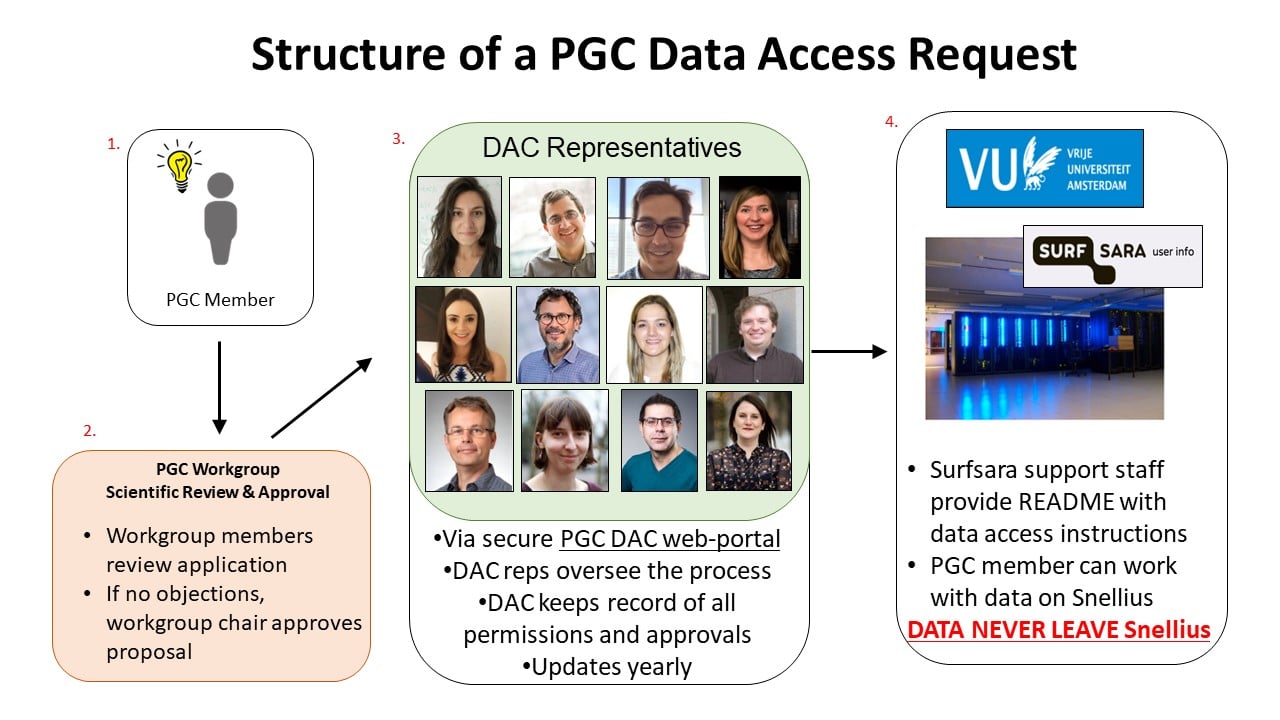Data Access Information
The PGC is committed to an open source philosophy while keeping within the limits of national laws and ethical review restrictions. The goal of the open sharing of data is to engage more research groups, maximize knowledge, and accelerate progress on important psychiatric conditions.
Members of the PGC indicated their agreement with PGC data sharing policies with the PGC Memorandum of Understanding (MOU).
If you are a new investigator and have questions about data sharing, please contact your workgroup chair for details.
How to Request Data Access
View PGC Data Access Director Lea Davis’ Presentation: “The PGC Data Access Portal and Genomic Privacy“
Find Available Datasets
- GWAS summary statistics are available without restriction on the Download Results page.
- Access to individual level data from each phenotype may be requested through the Data Access Portal - located on each working group page. Consult the PGC Workgroup DAC representative for a list of available datasets.
Request Individual Level Data
- Consult your workgroup DAC representative to make sure that the data you are requesting is appropriate for your analysis plan. Your DAC representative can let you know if there are any special permission requirements needed.
NOTE: You should allow at least a week for your DAC representative to respond. - You will need to agree to the terms of the PGC3 memorandum of understanding (MOU). Send a signed copy to your workgroup chair.
- You will need to obtain an account on Snellius. This usually takes only a couple of days. More information listed below.
NOTE: Obtaining an account on Snellius should only be done after the proposal is approved. - You will write a secondary analysis proposal and submit it to your workgroup chair (and cross-disorder chair, if necessary).
NOTE: Typically secondary analysis proposals are reviewed within three weeks. - All workgroups have a “fast-track” data package that is available once the workgroup approves the proposal. However, some additional data sets may require explicit permission from individual investigators, dbGAP, NIMH, or a sponsoring foundation.
NOTE: You will need to secure any special permissions for data sets not included in the “fast-track” data package. This is the most time consuming step and can take anywhere from 3-6 weeks. For most phenotypes, the vast majority of the data is available through the “fast-track” data package. - Once you have an approved proposal and documentation of any “special permissions,” you may request data through the Data Access Portal.
Gain Access to SNELLIUS
Most PGC analyses are done on Snellius, in the Netherlands. You or someone in your group will need to have an account on this cluster in order to access individual level genotype data.
To obtain a Snellius account, follow these instructions.
If, at a future point, you determine that you need additional compute time on Snellius, you will be able request this by submitting the same form described in the instructions for obtaining a Snellius account.
If, at a future point, you determine that you need to request a workgroup-specific Snellius partition, within the pgcdac project space, you will be able to request a partition by submitting the Snellius partition request form.
Prior to applying for a Snellius account, please review the following informational sheet.
Write a Secondary Analysis Proposal
The secondary analysis proposal includes a brief description of the rationale for the proposal, the analytic plans, the data being requested, the individuals who will be involved in the work, the timeline, and the plans for publication. When trying to decide how much detail to include, it is better to err on the side of too much rather than too little so that the workgroup has enough information on which to make a recommendation. The approval is awarded to the project, meaning that approval is given for the project that you describe.
NOTE: We realize that analytic strategies can sometimes change through the course of analysis. If you find that your plan has significantly shifted course, you should speak with your DAC representative to determine if the project has changed enough to be considered a new project.
Acknowledgements
The PGC is deeply grateful to our colleagues in the Netherlands. We thank SURF and VU University Amsterdam for the support in using the National Supercomputer Snellius.

